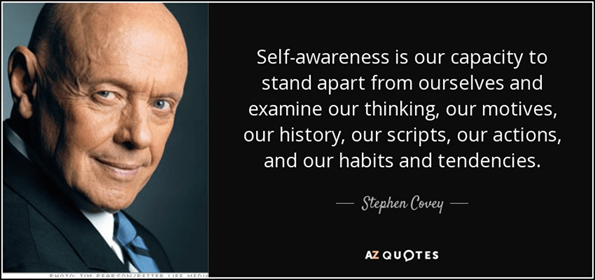In her TEDx Talk, Tasha Eurich reports that 95% of people think they are self-aware, yet only 10-15% are actually self-aware.
That is such a huge disconnect! How can we explain that?
It has not been until recently that I feel like I can clearly articulate why so many people are not nearly as self-aware as they think they are.
What is Self-Awareness?
In my opinion, Stephen R. Covey provides us with the best definition of self-awareness:

The Requirement to Be Self-Aware
This definition suggests that in order to be self-aware, it requires that we be fully aware of and in touch with what controls and drives our thinking, motives, interpretation of history, scripts, actions, habits, and tendencies.
The Key to Self-Awareness
Well, what is it that controls and drives our thinking, motives, interpretation of history, scripts, actions, habits, and tendencies?
It is our internal operating system.
If we want to become self-aware, we need to become aware of and in touch with our internal operating system.
What is Our Internal Operating System?
A computer has an internal operating system. It controls and regulates the computer. It operates automatically. It undergirds everything the computer does. And, it contains programming that is prone to regulate. If I ask my computer to perform a certain function, it will perform that function.
We also have an internal operating system. It controls and regulates us. It operates automatically, and for people unfamiliar with their internal operating system, it also operates subconsciously. It undergirds everything that we do. And, it contains programming that we are prone to regulate.
What is our internal operating system, exactly?
Simply put, our internal operating system is our nervous system. The major organ of our nervous system is our brain, but our nervous system is also connected to all aspects of our body, creating consistent communication between mind and body.
Our nervous system has three primary jobs that play a significant role in how our internal operating system functions:
- Keep us alive and safe – our IOS directs us away from pain and toward pleasure
- Process and encode the information our senses bring to our brain (e.g., when I see a clown do I laugh or get scared?)
- Bodily regulation (e.g., are you a reactor or an intentional responder?)
Psychologists have reported that 95 percent of our thinking, feeling, judging, and acting is driven by our subconscious automatic processing. What they are referring to is this concept that we have an internal operating system and it drives and dictates nearly everything we do.
People’s Internal Operating Systems Vary in Quality
It is important to recognize that people’s internal operating systems vary in quality. Just as we can line people up from shortest to tallest, we can line people from least sophisticated internal operating system to most sophisticated internal operating system.
People with an unsophisticated internal operating system are wired for self-protection, and this commonly manifests in the following ways:
- Reactive
- Passive
- Operates as the passenger of their life
- Prone to shut down/easily gets defensive
- Pessimist
- Close-minded
But, people with a sophisticated internal operating system are more wired for value creation, and this commonly manifests in the following ways:
- Intentional responder
- Proactive
- Operates as the driver of their life
- Willing and able to be vulnerable/has a wide window of tolerance
- Optimist
- Open-minded
How Self-Aware are You?
Having learned that you have an internal operating system and it is something that dictates 95% of your thinking, feeling, judging, and acting from largely a subconscious level, do you feel like you have a deep and clear knowledge of and connection with your internal operating system?
That is a high bar!
If you don’t feel like you have a deep and clear knowledge of and connection with your internal operating system, it suggests that you may be lacking in self-awareness.
(Don’t worry, we are all lacking in self-awareness to a certain degree.)
Remember, only 10-15% are “actually self-aware.”
If you want to become self-aware, you need to become intimately familiar with your internal operating system and have a clear understanding of how that is driving your thinking, motives, interpretation of history, scripts, actions, habits, and tendencies.
Your Next Steps to Deepen Your Self-Awareness
If you want to deepen your self-awareness, take my two FREE personal assessments, both of which are designed to help you become more aware and conscious of your internal operating system:
Also, feel free to check out my books:











